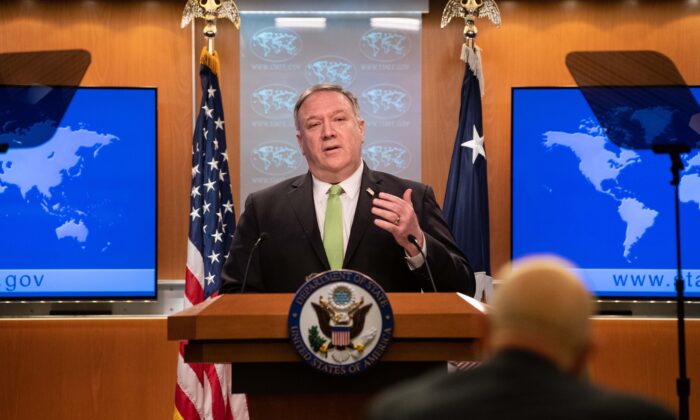Strict Isolation Measures in Place in Northeastern China as Virus Continues to Spread
U.S. Secretary of State Mike Pompeo on May 27 certified that Hong Kong is no longer autonomous from China, following the Chinese regime’s recent move to tighten its grip over the city.
“Today, I reported to Congress that Hong Kong is no longer autonomous from China, given facts on the ground,” Pompeo said in a tweet. “The United States stands with the people of Hong Kong.”
Under the Hong Kong Human Rights and Democracy Act of 2019, the secretary of state must certify every year whether Hong Kong is sufficiently autonomous from the mainland to justify special trading privileges granted by the United States.
The territory, a former British colony, returned to Chinese sovereignty in 1997, with Beijing promising to preserve its autonomy and freedoms under the framework of “one country, two systems.”
Pompeo today certified to Congress that Hong Kong does not continue to warrant special treatment under U.S. law. These privileges include the areas of trade, investment, and immigration, and has meant that current U.S. tariffs on billions of dollars worth of Chinese goods do not apply to Hong Kong.
“No reasonable person can assert today that Hong Kong maintains a high degree of autonomy from China,” he said in a statement.
It is unclear if the Trump administration will proceed to revoke Hong Kong’s special privileges, which requires an executive order by the president. The state department did not respond to a query from The Epoch Times.
The secretary described Beijing’s recent plans to impose a national security law on Hong Kong, bypassing the city’s legislature, as a “disastrous decision,” adding that the action was “only the latest in a series of actions that fundamentally undermine Hong Kong’s autonomy and freedoms.”
He added: “While the United States once hoped that free and prosperous Hong Kong would provide a model for authoritarian China, it is now clear that China is modeling Hong Kong after itself.”
Beijing recently said it would take countermeasures if the United States issues sanctions due to recent developments in Hong Kong.
President Donald Trump told reporters on Tuesday that his administration was planning to take action in response to the regime’s move “before the end of the week,” but declined to provide details.
Through the White House press secretary, Trump also said he doubted that Hong Kong could remain a global financial hub “if China takes over.”
Pompeo’s decision comes hours after thousands took to the streets in Hong Kong to oppose a new bill that would criminalize disrespect of the Chinese national anthem. On Sunday, police fired tear gas after thousands also turned out to voice their anger toward the new national security law.
Focus News: Pompeo Declares Hong Kong No Longer Autonomous From China, Slams Beijing’s Proposed Security Law
Taiwan Considers Revoking Hong Kong’s Special Status as Beijing’s National Security Law Looms
